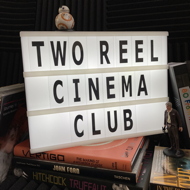Back in the 80s, when we were naive enough to think that the song ‘White Lines’ was a road safety anthem, cocaine was a big thing in movies – and not a small thing in the movie industry. Join us in a cramped toilet cubicle for a few snorts of our favourite cocaine films, including Die Hard, Annie Hall and Maria Full of Grace. Plus a quick look at drug slang, a celebration of Melle Mel, and a little insight into how medical grade cocaine is used legally.
Episode 53: Cocaine Bear vs Grizzly Man: Dude, Where’s My Bear?
We take a hike in the wilderness for this week’s episode, and find ourselves shimmying up a tree at speed in the hope of avoiding the worst of Cocaine Bear, the not-so-impressive new comedy horror from the Lord and Miller stable. Then once we’re in a position of safety we take our time with Werner Herzog’s astonishing and revelatory 2005 documentary Grizzly Man. There’s a lot of gruesome violence between these two, but which film has the scariest bear in it? Which film has the most heinous cliches? And why is the most frightening character in either of these films someone who is barely seen on screen at all? Plus a self-help book from the master of suspense, a quick look at new European features ‘Close’ and ‘Godland’, reflections on ‘Medical Student TikTok’, a revisit of a tasty Pixar classic and a confession that at least one of us doesn’t know what a ‘wheelhouse’ is. What IS a wheelhouse? Seriously? What do you wheel in it?
Bonus Features
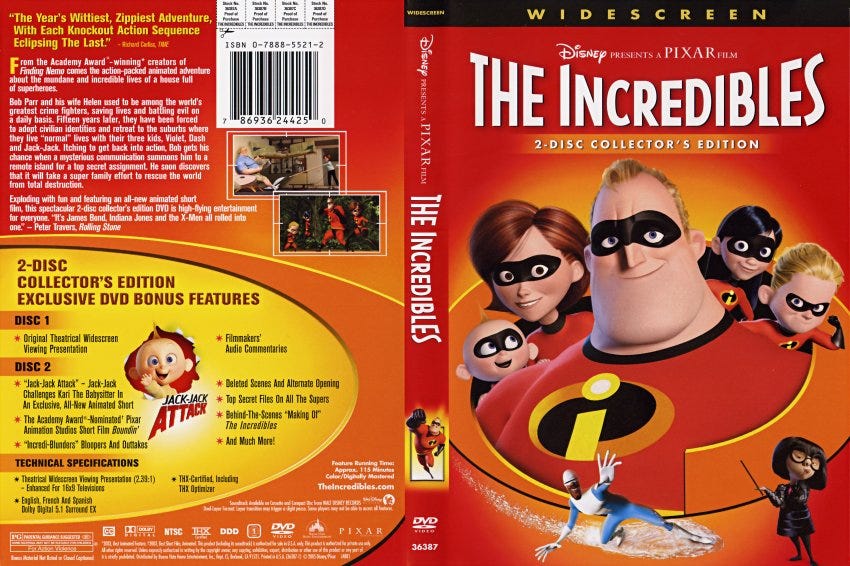
This week on the pod we’re talking about the Werner Herzog picture Grizzly Man. It’s an amazing collage of interviews, archive material and found footage, but interestingly there is a bonus feature on the DVD about the making of the film’s soundtrack which probably sheds as much light on one of the primary themes of the film as anything that appears in the main event. Herzog subtly manipulates and directs the musicians in much the same way that he does the actors, his process clearly visible on camera.
It made me realise how much I miss the bonus features that used to be the norm at the height of the DVD revolution. This was one of the selling points of these silver discs when they were first introduced. At the time it wasn’t clear if the improved picture quality of DVD over VHS cassette was going to be enough to convince consumers to switch to the new format, so the notion of bonus features like alternative soundtracks and director’s commentaries, ‘making of’ documentaries and deleted scenes were all crammed onto the disc and advertised with stickers and banners.
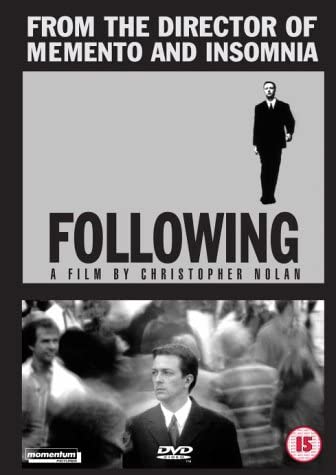
Some of these add-ons amounted almost to a film-school-in-a-box. The DVD for Christopher Nolan’s debut ‘Following’ had a feature that let you follow along with the shooting script, gave you the option to rewatch the scenes of the film in chronological instead of narrative order, and had a director’s commentary that was 50 percent of a complete course on low budget film making. Robert Rodriguez’s commentary for ‘El Mariachi’ filled in the other 50 percent.
Where are the directors’ commentaries now? I have no evidence, but I suspect they’ve died because of a mix of budget constraints and filmmakers’ reluctance to draw back the curtain. Any extras that still exist have become promotional shorts on YouTube or music videos. Online streaming would be the obvious home for these bonuses, but perhaps there simply isn’t the demand.
Instead maybe DVD will become the new vinyl in a few years, when nostalgia for the golden age of directors’ commentaries becomes a cool hipster thing. Just in case, I won’t clear out all those old DVDs in the attic just yet. Might be sitting on (under) a goldmine…
Episode 52: Popcorn Counter: Call Me Maybe
We get stuck in a phone booth on the way to the popcorn counter this episode. (Do they still even exist?) Mobile telephony has ruined a lot of plots since about 1999, and smart phones have spoiled even more since 2007, but on the other hand there have been some great telephone scenes in cinema. We talk about the joys and pitfalls, celebrate Hal Hartley and Scorsese, curse Steve Jobs, and discuss the lengths we’ve had to go to in our own projects to stop someone’s phone ruining the whole thing.
Ratatouille (2007): The Epicureans
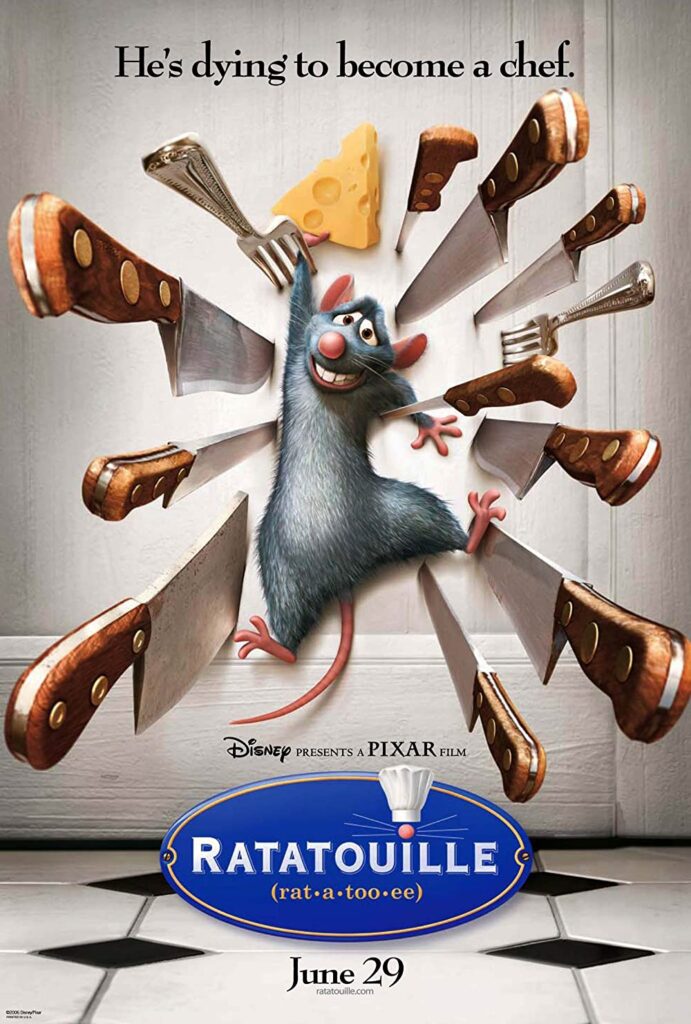
Many years ago we enjoyed a wonderful week’s holiday in Paris, and, yes, we did go to the Eiffel Tower and the Louvre and the Fondation le Corbusier, but largely we spent our time eating. Every night we visited a different restaurant, with the exception of a place almost opposite the hotel called ‘Les Epicureans’, I believe, which we went to twice, and where the maitre d’ looked exactly like Kevin Spacey. (I am aware that detail is no longer the mildly amusing story it used to be…)
This Saturday we watched Brad Bird’s 2007 movie Ratatouille – written by Bird with Jan Pikava and Jim Capobianco – and I was reminded vividly of that week, set as it is in a recognisable (though romanticised and Disneyfied) Paris.
The film is superficially an aspirational fable about achieving your goals, but at its heart it is a nested series of love stories. Family love and its associated expectations for Remy the culinary rat, workplace love for Linguini the love child of the famous chef Gusteau and fierce sous-chef Colette (although their affair is the most underbaked ingredient in the movie in my opinion…)
But greater than all of these, the film is about the love of food. It is a film about food made by people who love food. And sure enough the food looks and sounds fabulous. The camera is synaesthetic and Proustian in its appreciation.
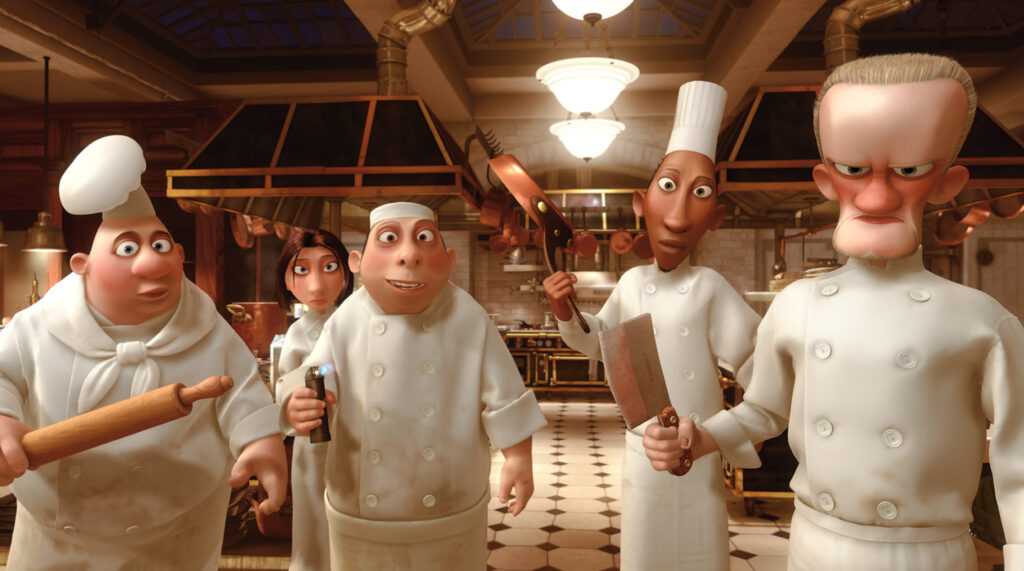
Yet underneath the gastronomic headlines, what the film really gets right in my opinion is the tone of working in a restaurant kitchen. My first job was in a steak house in the village where I grew up, and Ratatouille’s portrayal of the eclectic team of outsiders working behind the swing doors and the high pressure mix of camaraderie, ambition and drudgery that forms a day at the hob is brimming with authenticity.
This, I think more than any other aspect of the film, is what elevates it. It underlines one of the fundamental principles of writing for the screen: whatever the film seems to be about, it is always really about the characters. We may come for the food, but we stay for the staff.
Episode 51: Women Talking vs Women on the Verge of a Nervous Breakdown: Nervous Women Talking
Sarah Polley’s new film Women Talking gives us plenty to discuss this episode, with shocking violence, sobering drama and a deep examination of patriarchy, all delivered through outstanding performances. But for all its excellence, we have one major criticism: is it really a film at all? Then after the break we compare it to Pedro Almodóvar’s 1988 international hit Women on the Verge of a Nervous Breakdown. Two different looks at the issues facing women, with wildly different presentation, but it turns out they have more in common than we expected. Plus some IMDB news, a viewing of 2011’s Jane Eyre adaptation, a look at this year’s Oscar short film nominees, a trip to watch live theatre group Manual Cinema, an ad about the future of food science and a brief interlude while we let the dog out. There’s always an animal connection, isn’t there?
Episode 50: Popcorn Counter: Frenemies
This time as we shoot the breeze at the Popcorn Counter, we have a confession about school punishments, make a trip through the Chambers English Dictionary and add some reminiscences about the UK stand-up comedy scene before we compare some of our favourite frenemies in cinema. Surely, any proper believable friendship on screen has an element of the frenemy about it, doesn’t it? It’s yin and yang. Butch and Sundance, Whiplash, the Avengers and more come up for discussion before we realise that we’ve already been down this road in one of our own scripts a few years ago…
Episode 49: The Banshees of Inisherin vs The Field: Donkey Redux
Welcome back to the Two Donkey Cinema Club, where we seem to exclusively discuss donkey based films from around the world. This episode, current Oscar favourite The Banshees of Inisherin grazes the pastures alongside 1990 Richard Harris classic The Field. These two films about rural Ireland have so much in common that one feels almost like a remix of the other. But their differences really underline the ways the world has changed in the last 32 years. Which film goes full Hamlet, and which one warns the audience: beware of the artist? Plus the Cliche Squad turns up to arrest some fiddlers, we discover we both want to be the same character but for very different reasons, there’s a quick look at Puss In Boots and Regle du Jeu, and we have a very, very brief word from our sponsor.
Episode 48: Popcorn Counter: Animal Boxing
This place is like a zoo! After a week of donkey pictures we’ve set up a short series of bestial fights at the popcorn counter, pitting some of our favourite animal movies against each other to see which will win. Just two rules: no anthropomorphism, and no mercy. Can Bambi defeat King Kong? Do bears dream? And who will reign supreme as the king of the Hollywood jungle?
Episode 47: Eo vs Au Hasard Balthsar: Donkey Kong Country
It’s on like Donkey Kong at the Two Reel Cinema Club this episode, as we watch new Polish donkey movie and best international feature Oscar contender Eo, and yoke it up to its direct ancestor, the 1966 Robert Bresson movie Au Hasard Balthasar. There’s plenty of uncomfortable watching here, with many scenes of cruelty to both animals and humans, but there is also hope, kindness and love on screen. Which film left us numb and which film made us literally shout, ‘No!’ at the screen? Which film makes best use of its religious imagery, and which film features some of the most beautiful cinematography we’ve seen in recent months? Plus a remarkable snippet of biographical background from Andres, our new VHS Video Library venture, a miniature snowed-in film festival, and our close personal identification with truck drivers and The Cubeman.
